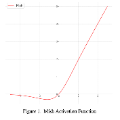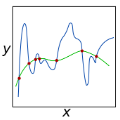We investigate data-driven forward-inverse problems for Yajima-Oikawa (YO) system by employing two technologies which improve the performance of neural network in deep physics-informed neural network (PINN), namely neuron-wise locally adaptive activation functions and $L^2$ norm parameter regularization. Indeed, we not only recover three different forms of vector rogue waves (RWs) by means of three distinct initial-boundary value conditions in the forward problem of YO system, including bright-bright RWs, intermediate-bright RWs and dark-bright RWs, but also study the inverse problem of YO system by using training data with different noise intensity. In order to deal with the problem that the capacity of learning unknown parameters is not ideal when the PINN with only locally adaptive activation functions utilizes training data with noise interference in the inverse problem of YO system, thus we introduce $L^2$ norm regularization, which can drive the weights closer to origin, into PINN with locally adaptive activation functions, then find that the PINN model with two strategies shows amazing training effect by using training data with noise interference to investigate the inverse problem of YO system.
翻译:我们调查Yajima-Oikawa(YO)系统的数据驱动前向问题,方法是使用两种技术改善深物理知情神经网络神经网络(PINN)的性能,即神经智能本地适应激活功能和2美元规范参数规范化。事实上,我们不仅通过三个不同的初始界限条件,在YO系统前期问题中恢复三种不同形式的矢量无序波(RWs),包括亮亮RWs、中间裸露RWs和深浅RWs,同时利用不同噪音强度的培训数据研究YO系统的反面问题,研究YO系统的反面问题,研究YON系统的反面问题,从而发现两种战略的PINN模型显示通过使用有噪音干扰的培训数据调查YO系统产生的惊人的培训效果,学习未知参数的能力并不理想。



